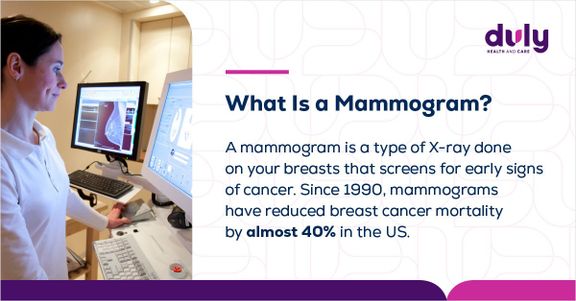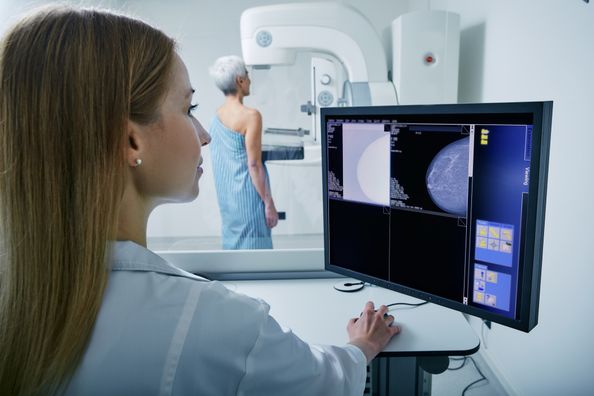The changing of the seasons, yearly anniversaries, and your favorite holidays are all important parts of each passing year. But if you are a woman between the ages of 40 and 54, you may also keep track of passing time with your annual mammogram.

Source: Centers for Disease Control and Prevention
Getting your annual mammogram is a crucial part of your preventative health routine, and it can help you and your doctor monitor any changes in your breasts over time.
Whether you’re getting ready for your first or tenth mammogram, you may be surprised by some of the answers to these common mammogram questions.
1. When should I get my first mammogram?
You should get your first mammogram at age 40. It’s important to start getting mammograms in your early 40s because nearly 17% of breast cancers happen in women between the ages of 40 and 49. Once you’ve gotten your first mammogram, you should continue getting one every year.
Is it time for your first or annual mammogram? Schedule your annual mammogram appointment online or by calling 1−630−545−7880.
2. Are mammograms painful?
Many people describe getting a mammogram as uncomfortable, but it is not necessarily painful. What a mammogram feels like can depend on a range of factors, including the size of your breasts or how sensitive your breasts are that day. While the pressing and stretching of your breasts may be uncomfortable, a mammogram only lasts about 20 minutes, with the compression discomfort only lasting a few seconds.
3. What should I do to prepare for a mammogram?
Unlike other routine cancer screenings (like a colonoscopy) you don’t have to make any changes to your eating or drinking habits before a mammogram.
On the day of your mammogram, you simply need to avoid wearing:
- Deodorant or antiperspirant
- Perfume
- Lotion
All these substances can show up as white spots on your mammogram. Because a mammogram requires you to undress from the waist up, you may also want to avoid wearing a dress. By wearing a shirt and pants/skirt, you can easily undress for your imaging.
4. What kinds of things will I learn from a mammogram?
After your mammogram, you will typically receive your results from Duly in about 24 – 48 hours, however, sometimes it can take a little longer. During that time, a radiologist will review the images of your breast, and look for early signs of cancer that can take the form of:
- Masses (abnormally shaped sections of breast tissue)
- Calcifications (small white spots made of calcium)
- Asymmetries (areas in your breast tissue pattern that look different from the remaining breast)
Your mammogram can also tell you the density of your breasts (something you can’t determine on your own). Starting September 10, 2024, all mammogram reports in the United States must disclose your breast density. Illinois law to notify women of their breast density in mammogram results went into effect on January 1, 2019.
5. What does it mean if I have dense breasts?
Your breasts are made up of different kinds of tissues, and your breast density is determined by the distribution of these tissues. If you have dense breasts, it means that you have relatively more fibrous and glandular tissue than fatty tissue.
Dense breasts are fairly common, with approximately 50% of women who are 40 years old or older with dense or very dense breasts. The density of your breasts can change also as you age, becoming less dense as you get older.
6. Does having dense breasts affect my cancer risk?
Despite how common it is to have dense breasts; many women do not realize breast density is an independent risk factor for breast cancer. Medical experts are not entirely sure why this is, but one theory is that dense breast tissue contains more cells — meaning there are simply more cells that have the potential to become abnormal and develop into cancer.
Even if you have dense breasts, a mammogram can still detect many signs of breast cancer, but it may be limited. There are supplemental screening options for those with dense breasts, including breast ultrasound, to detect signs of breast cancer that may be hidden by dense tissue on a mammogram.
7. What is a screening breast ultrasound?
Breast ultrasound is a technique that uses high-frequency sound waves to form an image of breast tissue. No radiation is used to form the images. In screening breast ultrasound, both whole breasts are imaged to find cancers that may not be seen on screening mammograms. A scan of the underarms is also included in the examination. Cancers are usually seen as darker and/or irregular areas compared to the surrounding tissue. Screening ultrasound can benefit women with an average risk of breast cancer with dense breasts.
It is important to note that screening breast ultrasound alone is not sufficient to screen for breast cancer as it cannot detect tiny calcifications which can be a sign of early breast cancer. Calcifications are best seen- and oftentimes only seen– on mammograms. Therefore, if you decide to get a screening ultrasound, it should be in combination with a screening mammogram (at the same time or within 6 months).
8. What does it mean if I get called back after a mammogram?
After your mammogram, your provider may call you back into the office for further imaging — especially if you’ve just had your first mammogram or if you have dense breast tissue. When your provider does not have a previous mammogram to compare your results to, a follow-up mammogram can be helpful.
A call-back mammogram should not be an immediate cause for concern, so don’t panic. If your provider calls you back, it simply means additional views/imaging are needed to get a closer look at a particular area of concern before a more definitive assessment can be made about the finding.
9. What do I do if I’m nervous about getting my mammogram?
Breast cancer is something that affects many women, and it’s normal to feel a little anxious about your first mammogram. You may be worried about what your mammogram is going to feel like or what your results will look like.
Just remember that getting your mammogram is an important way to protect your breast health. If you learn more about what to expect and talk to your provider ahead of time, it will help to keep your worries at bay.
Mammograms are one of the best tools available to detect breast cancer early.
Health Topics:


